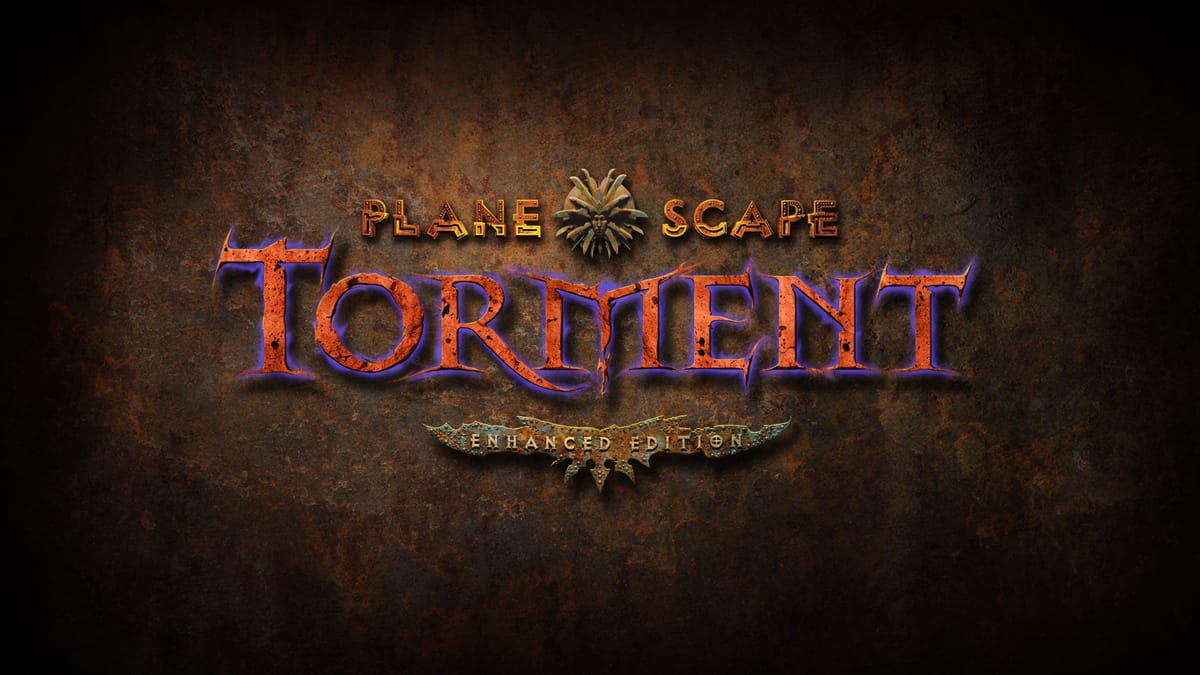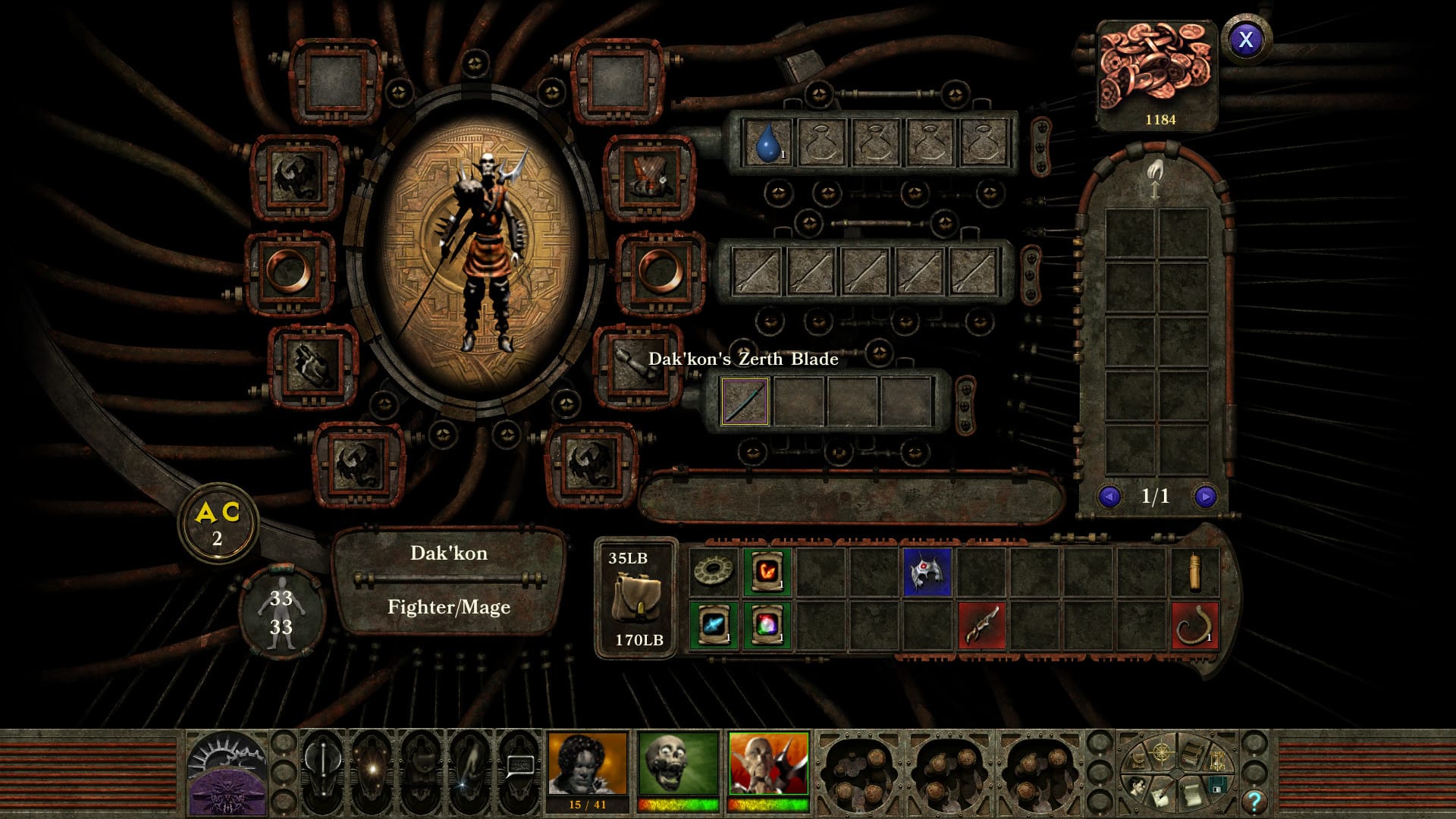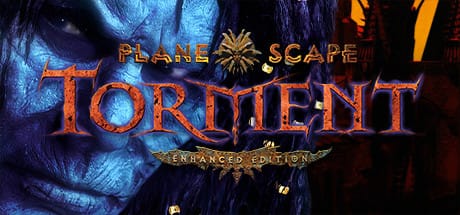Planescape: Torment: Enhanced Edition: Colons

What happens in 2024 after you beat Baldur's Gate 3 for the second time in a row and you can't handle a third round yet? You dive into some other great CRPGs. And what happens when a podcast, the Resonant Arc Podcast (Honestly a great podcast for deep dives on RPGs), starts up Planescape Torment? You install and start in on one of the weirdest, densest RPGs of all time. This was a massive undertaking for me, being a mostly text based game with over 800k words in it (Over 3 times the length of Ulysses by James Joyce), although it's not all words. So, let me give you some background to what Planescape: Torment is and why I highly recommend it to people seeking a really philosophically dense story.
Overview
Planescape: Torment was released in 1999 by Black Isle Studios, the predecessor to Obsidian Entertainment, and the Enhanced Edition was released in 2017. The game was made in the Infinity Engine, which was the same engine as Baldur's Gate (The first one), and it used the Advanced Dungeons & Dragons 2nd Edition system. It's a CRPG, which stands for Computer Role Playing Game, where the player controls the character by clicking around the game world and interacting with objects via spells, attacks, and conversation. This is one of the granddaddies of modern RPGs, so lets break down how it works.
You start the game with some character creation, giving The Nameless One (our protagonist) the stats you want (Strength, Dexterity, Constitution, Wisdom, Intelligence, Charisma). This game is not very combat heavy, and weirdly Wisdom gives you a huge EXP bonus alongside more conversation options, so I went with the recommendation to max out Wisdom, then fill up Intelligence and Charisma to open up the most dialogue options. The Nameless One then awaken in a mausoleum, with nothing but a talking, annoying skull Morte dunking on you. From there you talk to a ghost, learn about the dustmen, and escape to Sigil: The City of Doors to try to figure out who The Nameless One is.

This is D&D, therefore there is combat, which is pretty simple all things considered. You attack enemies, they attack you, continue until someone is dead. This gets more complicated as you gain more followers or change classes, but overall the combat usually is letting your party slap something, pausing to cast a spell or heal, and then continuing the slap fest. I know, it sounds like a riveting game, but that's not the end of the silliness. There is also item and spell management, which involves a lot of clicking on an item and putting it in the right spot. Or opening your spellbook, clicking on spells to add, then running around finding an inn to sleep in to get your spell slots back. This game has one of my favorite dumb things, which is "Open the inventory screen, use 20 healing items in the middle of the fight, then go back to beating the baddies." The gameplay elements are in service of the meat of the game, which is interacting with Sigil and the people that live there.
Why play Planescape: Torment Today?
The very first thing I'll point to as a "Why is this game good?" is the lead designer and writer, Chris Avellone. I'll start by saying yes, this is a dude who worked in game design as a higher up in the past three decades, so he's got some abuse of power grossness attached to him. I'm not gonna defend the guy or make excuses, I'm just going to also say that he did good work as a game designer. Games he had a major hand in include Fallout 2, Icewind Dale, Star Wars KOTOR II, Pillars of Eternity, Prey(2017), and one of my favorite games of all time, Fallout: New Vegas. He has a truly incredible body of work, and I think it's still worth learning from his design and writing.
So, does Planescape: Torment hold up to the lofty pedigree that followed in its footsteps? I am happy to report that yes, it does if you use a guide. Lets be real: old games aren't intuitively designed. Following a guide helps alleviate the pain points of the game, from not really knowing what's going on to what's a good strategy to follow for this inscrutable system. Additionally, a guide helps you not miss out on the incredible writing on offer by the side quests. There are so many moments in the game that rely on you doing something hours ago that making sure you picked up that one stupid item and kept it around for a good use is a huge life/time saver. Also, I fully admit that I used a console to create my character's intestines after I lost them at some point in order to learn a spell. Sometimes games are weird.
The setting of Sigil is rich and fully realized, using all sorts of language and terminology that makes it feel lived in. You hear people yelling"Cutter!" and asking for jink and you know that you're somewhere new. There are also 15 factions in Sigil, most are represented in the game. From the Sensates, who are all about experiencing as much of the planes as possible, to the Mercykillers, the justice seeking police analogue, there are all sorts of philosophies to uncover and experience here. From nihilism to anarchism to sheer chaos to believing you're a sliver of divinity and self improvement is worship. Sigil is the true neutral plane in the multiverse, and it's reflected in almost every way of life being present there. Lawful Modrons are forced into proximity with devils, the religious and the anti-theological folks debate on the street, and you're just some scarred corpse who woke up on a slab.
Not only is the game old, but it's purposely designed to be absolutely disgusting. There are many times in the game where you're looking at insane architecture or a grotesque being and just think "Gross!" That's what the game is going for. Heck, the face of The Nameless one is something only a mother could love. Your party members are skulls, half devils, burning mages, and other folks who seem to be in as much torment as the Nameless One. I got a mod, Journal Portrait Conversations, which updates the UI to show you a portrait of who you're talking to. This helped me get really into the conversations, looking at the gross potato woman who was teaching me to cast spells genuinely enhanced the experience for me.

I'm going to take this time to just go down a list of amazing or radical things that the game implements. Dak'kon is a githzerai fighter/mage who has a sword that sharpens based on his * Knowledge * of himself. Morte is a floating skull who taunts enemies, and his taunt gets better as you interact with people who cuss you out. There is a brothel for slaking Intellectual Lusts, filled with women who have philosophical debates with their clients instead of the obvious (Likely due to technical limitations.) There is a giant golem in an impenetrable siege tower who is crafting weapons to wage a war on existence. In order to become a mage, you need to craft your own wizard's spellbook. You meet a pregnant alley and help it birth a new district of the city.
So yeah, if any of that sounds interesting to you, I can wholeheartedly recommend this game.
Sigil and Torment
At the start of this article, I stated that this is a really philosophically dense story. I view Planescape: Torment as a game that rewards investment, but isn't fun. Like a college text, the more you think about it, the more you get out of it. The characters, the ideology at play, the dense nature of the writing, all unfold when you think about them. When I think of Philosophy, I think of it as the "why" and the "how" of things. Everything in Sigil has its place, and everything put in this game was put there to flesh out Sigil. Every major actor in the game has a reason of being, and your job as the player to not to judge them as right or wrong, but to try to understand their perspective.
Lets deep dive on the first faction you meet in the game: The Dustmen. They are also known as The Dead due to the fact that they're working towards the final death of the universe. They care for the dead of Sigil, and believe that everything would be better if it were Nothing. They are the ultimate utilitarian nihilists, believing that life has no point and thus everything should just stop. They sign contracts for use of people's bodies after they die, giving them money in exchange. The strange part of the Dustmen is that people do actually join them because their philosophy is hard to argue against. They fall into the trap of Nihilism and you're able to actually stir some feelings in some dustmen again. There are even some who have gone fully around to feeling again, seeing that in the end they're going to be just as dead, just as empty, as any other cutter, so they might as well seem normal to non-dusties. All of this is in the first hour or so of the game, and you meet just as developed factions across Sigil, building up the world and it's themes.
"What can change the nature of a man?" is one of the defining questions asked in Planescape: Torment. It argues that many things can, but in the end only you can answer that question for yourself. Be it love, belief, revenge, desperation, no matter your answer, that answer is true for you. Another great idea is that belief in something can actually change the world to make that thing true. If you were to start going around giving out a different name to your own, eventually that name will be your name and it was your belief in that new name that changed reality. If you tell your loved ones every day that you love them, they will eventually adapt and tell you that they love you back. Belief is something extremely powerful, the placebo effect being one of the best examples of this, and Planescape: Torment really gets you to think about that.
That's the point here: This is a game that isn't fun, but it engages you to think about what it is asking you. Like a good teacher, it asks you questions without providing solid answers. Is it good to join the dustmen? You're allowed to, they support you in doing so, but many players graduate to other factions as the game progresses. It poses many ideas for the player to grapple with, it asks the questions that have no answers. I believe that games are powerful due to them being a medium that is truly interactive. Your actions prompt responses from the game, be it jumping on a goomba to selling rat tails to the exterminator. One results in some points and progression, the other results in the rats fighting back against the exterminator. Both are games.
Conclusion
To wrap up, I think if you're interested in a game that gives you a safe space to grapple with ideas, Planescape: Torment is one of the best. If you're looking for more combat focus, Baldur's Gate 3 is what you're seeking while still having juicy storytelling. Disco Elysium is a better arena for wrestling with challenging new ideas. If you want an old man farting in a leather chair in a library, with a snifter of whiskey, asking you the nature of reality and also if you saw the boobies on that one lady, then Planescape: Torment is your game.